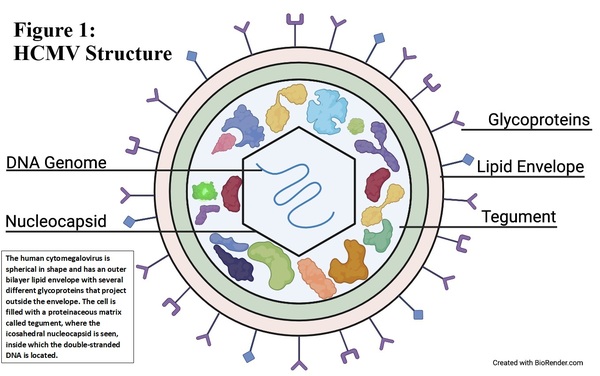Using CRISPR technology to inhibit the replication of human cytomegalovirus by deletion of a gene promoter
(1) Cranbrook Kingswood High School, Bloomfield Hills, Michigan, (2) Wayne State University, Detroit, Michigan
https://doi.org/10.59720/21-060
Human cytomegalovirus (HCMV) causes serious infections in immunocompromised patients. It is ubiquitous in nature and has the potential to be transmitted via non-sexual contact (saliva, breast-feeding, placental transfer, blood transfusion, organ transplantation) or sexual contact. Although HCMV infection resolves spontaneously in immunocompetent hosts, it causes serious life-threatening disease in immunocompromised patients and can reactivate from latency at any time during life when the host’s immune system is compromised. Management of these infections is complex as currently available antiviral agents have several limitations, and thus mortality of these infections approaches 50%. Reactivation of latent HCMV remains a major concern and is associated with a high morbidity and mortality in high-risk immunocompromised adults. Although great progress has been made in the management of HCMV disease over the last several decades, management options are still limited due to major issues with dosing and side effects. Also, none of these medications inhibit latent HCMV lying dormant in cells. Gene-based targeting mechanisms have the added advantages of inhibiting not only the reactivated HCMV but also the latent HCMV in cells, as well as stopping the dysregulation of innate immunity occurring during the early stages of HCMV infection. Using CRISPR/Cas9 technology/synthetic single gRNA, site-specific cleavage was carried out with successful deletion of a major intermediate early gene promoter/enhancer (MIEP/E) of HCMV. This study demonstrated the efficacy of the sgRNA-CRISPR/Cas9 strategy to delete the MIEP/E of HCMV. Deletion of this promoter is expected to block the expression of early and late phase genes, inhibit HCMV replication, prevent latency, and protect the cellular immune system, in immunocompromised patients.
This article has been tagged with: